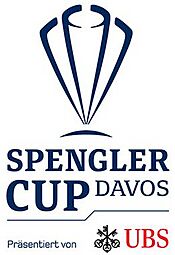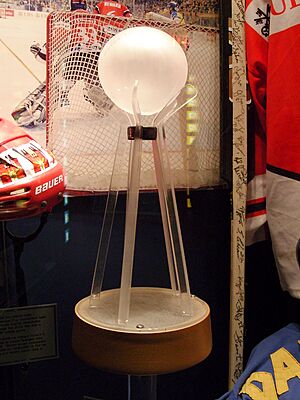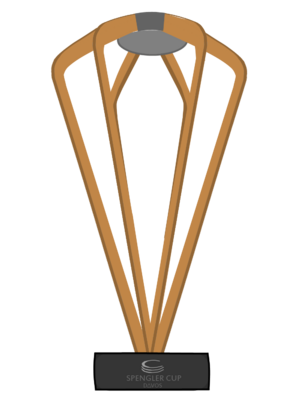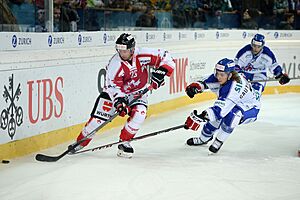Spengler Cup facts for kids

Spengler Cup logo
|
|
| Sport | Ice hockey |
|---|---|
| Founded | 1923 |
| Founder | Dr. Carl Spengler |
| Inaugural season | 1923 |
| Organising body | HC Davos |
| Motto | The Peak of Hockey |
| No. of teams | 6 |
| Countries | Switzerland, Canada, various other European countries |
| Venue(s) | Eisstadion Davos (Davos, Switzerland) |
| Most recent champion(s) |
|
| Most titles | (16 each) |
| Qualification | Invitation only |
| TV partner(s) | SUI: Schweizer Radio und Fernsehen Europe: Eurosport 2 RUS: Match TV & NTv2 GER: Sport1 CAN: TSN & RDS USA: ESPN+ CZE / SVK / HUN: Sport1 DEN: TV2 SLO: Šport TV SRB / CRO / BIH / MNE / MKD: Arena Sport GBR: Viaplay |
The Spengler Cup is a super old and exciting ice hockey tournament. It happens every year in Davos, Switzerland. It started way back in 1923. This makes it one of the oldest ice hockey tournaments in the world. The Swiss team HC Davos hosts the event. Games are played from December 26th to 31st. All the matches take place at the Eisstadion Davos.
The tournament was created by Dr. Carl Spengler. He wanted to help bring together ice hockey teams from German-speaking parts of Europe. This was important after World War I. The tournament grew much bigger than anyone expected. Many famous teams from Europe and beyond have played in it. Teams from 13 different countries have won the Spengler Cup. HC Davos and Team Canada have won the most cups, with 16 each. Switzerland has won the most cups as a country, with 22 wins.
Teams from North America, like Team USA and even Team Japan, have also competed. Since 1990, Team Canada has been the main team from North America. In the 2018 tournament, the Finnish team KalPa won against Team Canada. The game was decided by a shootout, which was a first for the Spengler Cup final.
The Spengler Cup was not played in 2020 or 2021. This was because of the COVID-19 pandemic. In the 2024 tournament, the Swiss team HC Fribourg-Gottéron won the cup. They beat the German team Straubing Tigers with a score of 7–2 in the final game.
Contents
History of the Spengler Cup
Many teams that play in the Spengler Cup are club teams. This means they have players from different countries on their roster. The very first tournament in 1923 was won by the Oxford University Ice Hockey Club. This team was made up of Canadians who were studying at the University of Oxford.
For the first 24 tournaments, two teams were super strong. These were the host team HC Davos and the Czechoslovakian team LTC Prague. LTC Prague won 7 times. Between 1965 and 1983, teams from Czechoslovakia and the Soviet Union were very dominant. Since 1984, Team Canada has been the strongest team. They have won 16 times and been runner-up 10 times. Team Canada is usually made up of Canadian players who play in Europe.
From the start until 1978, the tournament was played on an outdoor ice rink. This outdoor rink is still there today. It is one of the biggest outdoor rinks in the world. Since 1978, all the games have been played indoors.
The Spengler Cup was canceled in 2020 because of the COVID-19 pandemic. It was planned to return in 2021, but it was canceled again. This was due to teams having players with COVID-19.
Tournament Sponsors
The Spengler Cup is a very big sports event in Switzerland. It's the second largest after a tennis tournament called the Swiss Indoors. In 2016, the tournament had a budget of 11 million Swiss francs. About 40% of this money comes from companies that sponsor the event. Since 1985, UBS has been the main sponsor. Other big sponsors include Würth, Schenker Storen, Škoda, Calanda, and Hostpoint.ch. Each of these main sponsors supports one of the six teams each year.
Watching the Games
The Spengler Cup is shown on TV in many countries. In Switzerland, you can watch it on Schweizer Radio und Fernsehen. In most of Europe, it's on Eurosport 2. Canadians can watch it on TSN and RDS. In the United Kingdom, you can stream it on Viaplay.
Spengler Cup Winners and Runners-up
| Year | Winner | Runner-up |
|---|---|---|
| 1923 | ||
| 1924 | ||
| 1925 | ||
| 1926 | ||
| 1927 | ||
| 1928 | ||
| 1929 | ||
| 1930 | ||
| 1931 | ||
| 1932 | ||
| 1933 | ||
| 1934 | ||
| 1935 | ||
| 1936 | ||
| 1937 | ||
| 1938 | ||
| 1939 | Tournament not held due to World War II | |
| 1940 | ||
| 1941 | ||
| 1942 | ||
| 1943 | ||
| 1944 | ||
| 1945 | ||
| 1946 | ||
| 1947 | ||
| 1948 | ||
| 1949 | Tournament not held due to high Cold War tensions | |
| 1950 | ||
| 1951 | ||
| 1952 | ||
| 1953 | ||
| 1954 | ||
| 1955 | ||
| 1956 | Tournament not held for financial reasons | |
| 1957 | ||
| 1958 | ||
| 1959 | ||
| 1960 | ||
| 1961 | ||
| 1962 | ||
| 1963 | ||
| 1964 | ||
| 1965 | ||
| 1966 | ||
| 1967 | ||
| 1968 | ||
| 1969 | ||
| 1970 | ||
| 1971 | ||
| 1972 | ||
| 1973 | ||
| 1974 | ||
| 1975 | ||
| 1976 | ||
| 1977 | ||
| 1978 | ||
| 1979 | ||
| 1980 | ||
| 1981 | ||
| 1982 | ||
| 1983 | ||
| 1984 | ||
| 1985 | ||
| 1986 | ||
| 1987 | ||
| 1988 | ||
| 1989 | ||
| 1990 | ||
| 1991 | ||
| 1992 | ||
| 1993 | ||
| 1994 | ||
| 1995 | ||
| 1996 | ||
| 1997 | ||
| 1998 | ||
| 1999 | ||
| 2000 | ||
| 2001 | ||
| 2002 | ||
| 2003 | ||
| 2004 | ||
| 2005 | ||
| 2006 | ||
| 2007 | ||
| 2008 | ||
| 2009 | ||
| 2010 | ||
| 2011 | ||
| 2012 | ||
| 2013 | ||
| 2014 | ||
| 2015 | ||
| 2016 | ||
| 2017 | ||
| 2018 | ||
| 2019 | ||
| 2020 | Tournament not held due to the COVID-19 pandemic | |
| 2021 | ||
| 2022 | ||
| 2023 | ||
| 2024 | ||
Notes
- 1 Oxford University and LTC Prague played to a 0–0 score after overtime. Both teams were declared winners.
Who Has Won the Most Cups?
Club Team Wins
| Club | Won | Runner-up | Years won | Years runner-up |
|---|---|---|---|---|
| 16 | 25 | 1927, 1933, 1936, 1938, 1941, 1942, 1943, 1951, 1957, 1958, 2000, 2001, 2004, 2006, 2011, 2023 | 1924, 1925, 1926, 1929, 1930, 1935, 1937, 1944, 1945, 1946, 1947, 1948, 1953, 1955, 1960, 1969, 1981, 1993, 1994, 1996, 1998, 2002, 2003, 2009, 2012 | |
| 16 | 10 | 1984, 1986, 1987, 1992, 1995, 1996, 1997, 1998, 2002, 2003, 2007, 2012, 2015, 2016, 2017, 2019 | 1985, 1988, 1990, 2000, 2001, 2005, 2006, 2008, 2010, 2018 | |
| 7 | 2 | 1929, 1930, 1932, 1937, 1946, 1947, 1948 | 1936, 1938 | |
| 5 | 5 | 1965, 1966, 1968, 1978, 1982 | 1970, 1971, 1977, 1983, 1984 | |
| 5 | 1 | 1980, 1981, 1985, 1989, 1990 | 1982 | |
| 4 | 1 | 1923, 1925, 1931, 1932 | 1934 | |
SKA Saint Petersburg |
4 | 0 | 1970, 1971, 1977, 2010 | – |
| 3 | 4 | 1924, 1926, 1928 | 1923, 1927, 1931, 1941 | |
| 3 | 1 | 1934, 1935, 1950 | 1958 | |
| 3 | 0 | 1959, 1960, 1961 | – | |
| 3 | 0 | 1972, 1973, 1974 | – | |
| 2 | 4 | 1952, 1964 | 1954, 1959, 1961, 1962 | |
| 2 | 3 | 1944, 1945 | 1942, 1943, 1952 | |
| 2 | 3 | 1993, 1994 | 1989, 1992, 1997 | |
| 2 | 2 | 1962, 1963 | 2004, 2022 | |
| 2 | 0 | 1953, 1954 | – | |
| 2 | 0 | 1967, 1969 | – | |
| 2 | 0 | 1983, 2008 | – | |
| 2 | 0 | 2013, 2014 | – | |
| 1 | 1 | 1955 | 1957 | |
| 1 | 1 | 1979 | 1987 | |
| 1 | 1 | 1991 | 2013 | |
| 1 | 1 | 2005 | 1999 | |
| 1 | 0 | 1975 | – | |
| 1 | 0 | 1976 | – | |
| 1 | 0 | 1988 | – | |
| 1 | 0 | 1999 | – | |
| 1 | 0 | 2009 | – | |
| 1 | 0 | 2018 | – | |
| 1 | 0 | 2022 | – | |
| 1 | 0 | 2024 | – | |
| 0 | 3 | – | 1991, 2015, 2016 | |
| 0 | 2 | – | 1950, 1978 | |
| 0 | 2 | – | 2007, 2014 | |
| 0 | 1 | – | 1928 | |
| 0 | 1 | – | 1933 | |
| 0 | 1 | – | 1951 | |
| 0 | 1 | – | 1963 | |
| 0 | 1 | – | 1964 | |
| 0 | 1 | – | 1965 | |
| 0 | 1 | – | 1966 | |
| 0 | 1 | – | 1967 | |
| 0 | 1 | – | 1968 | |
| 0 | 1 | – | 1972 | |
| 0 | 1 | – | 1973 | |
| 0 | 1 | – | 1974 | |
| 0 | 1 | – | 1975 | |
| 0 | 1 | – | 1976 | |
| 0 | 1 | – | 1979 | |
| 0 | 1 | – | 1980 | |
| 0 | 1 | – | 1986 | |
| 0 | 1 | – | 1995 | |
| 0 | 1 | – | 2011 | |
| 0 | 1 | – | 2017 | |
| 0 | 1 | – | 2019 | |
| 0 | 1 | – | 2023 | |
| 0 | 1 | – | 2024 |
Notes
- 1 Slovakia was a part of Czechoslovakia until 1993. So, HC Slovan Bratislava in the 1970s represented both communist Czechoslovakia and the Slovak Socialist Republic.
- 2 Ukraine was a Soviet republic at the time. So, Sokil Kiev represented both the Soviet Union and Soviet Ukraine.
Wins by Country
| Nation | Winners | Runners-up |
|---|---|---|
| 22 | 32 | |
| 19 | 10 | |
| 16 | 11 | |
| 13 | 5 | |
| 6 | 11 | |
| 5 | 1 | |
| 4 | 5 | |
| 4 | 2 | |
| 3 | 1 | |
| 2 | 8 | |
| 1 | 1 | |
| 1 | 0 | |
| 1 | 0 | |
| 0 | 4 | |
| 0 | 1 | |
| 0 | 1 | |
| 0 | 1 | |
| 0 | 1 |
Notes
- 1 This includes hockey clubs from the First Czechoslovak Republic, the Third Czechoslovak Republic, the Czechoslovak Socialist Republic, and the last Czech and Slovak Federative Republic. These were based in today's Czechia and Slovakia. It also includes Czechoslovak national teams.
- 2 This includes the runner-up 1967 Kingston Aces from the Ontario Hockey Association.
- 3 This includes hockey clubs based in today's Russia and Ukraine, and Soviet national teams.
- 4 This includes hockey clubs from the Weimar Republic, the Third Reich, Allied-occupied Germany, West Germany, and today's united Federal Republic.
- 5 This includes hockey clubs from the Kingdom of Italy and today's Italian Republic.
- 6 This includes CSKA Moscow's Cup win in 1991.
- 7 This includes hockey clubs from the French Third Republic, the Fourth Republic, and today's Fifth Republic.




